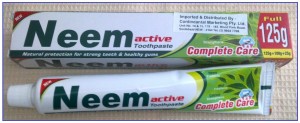In the old days the people in India did not use neem toothpaste. They used neem toothbrushes instead. Chewing on a neem twig has for many centuries been the commonly preferred way to prevent gum disease and maintain healthy teeth. These rural people had never used a “real” toothbrush, didn’t know Crest or Colgate, yet they had perfect teeth. A perfect natural solution. Researchers believe the tradition of using neem twigs for dental care has helped Indian villagers to avoid cavities and tooth loss, although they have no access to modern dental care facilities or products.
What does science say about neem and gum disease?
Researchers already knew that the leaves, twigs and seeds of neem trees have powerful antimicrobial and antifungal properties. So they set out to test just how efficient neem really was in treating gum disease. The study used a neem mouth gel made from dried neem leaves. A 25% alcoholic extract was prepared from the leaves, and then turned into a gel.
Does Neem Really Heal Gum Disease?
The study involved three groups of people:
- one group was treated with a mouthwash containing chlorhexidine gluconate (the most common ingredient in antibacterial dental care products),
- one group was treated with the neem gel,
- one group was treated with a placebo gel.
This neem gum disease study lasted six weeks, and the results were measured at zero, three and after six weeks. The outcome was clear:
Already after three weeks the users of neem gel showed the lowest dental plaque levels. They also had the lowest levels of harmful bacteria that are associated with the formation of dental plaque and tartar.
The result after six weeks was the same. The neem gel clearly outperformed the standard oral care product.
What Do Others Say About Neem In Oral Care?
In another clinical study 50 patients with advanced gingivitis were treated. 40 of them suffered from bleeding gums and pustular discharges from the gum. The patients were instructed to brush their teeth twice daily with neem toothpaste. (The toothpaste contained neem leaf extract.)
 After only three weeks 80% of them showed significant improvements. All patients had lower levels of bacteria, and bad breath had disappeared. There were no side effects.
After only three weeks 80% of them showed significant improvements. All patients had lower levels of bacteria, and bad breath had disappeared. There were no side effects.
Another study in Germany used 70 patients with periodontitis in different stages. The study reports similar results (stop of bleeding and discharge, gums return to healthy color) after only five to ten treatments with neem toothpaste and mouthwash.
Most studies were only very small, and not all were properly documented. They need to be repeated with a lot more people. However, neem was clearly shown to be suitable when treating mouth infections and gingivitis.
There are also read many stories of people who reported absolutely amazing results by switching to an oral care regime using neem products. Reversal of gingivitis, reversal of gum tissue loss etc. So much so that they managed to avoid already scheduled surgery.
If you take the known antibacterial properties of neem and combine them with its traditionally known ability to strengthen the immune system, then those stories sound believable.
Consider this:
There is no known cure for gum disease. A number of small studies, anecdotal evidence, and thousands of years of traditional use, all agree that neem may:
- prevent and heal gum disease,
- prevent cavities,
- eliminate bacteria that cause cavities and inflammation of the gums,
- prevent bacteria from adhering to your teeth (reduce plaque),
- enhance mouth immunity in general,
- and through all this freshen the breath.
Interesting Neem Toothpaste Fact: Did You know?
The researchers used mainly neem leaf powders and extracts in their research. Interestingly the neem leaf is not even the most effective neem product for dental care purposes, it’s the neem bark (hence the chewing of neem twigs).
But manufacturers don’t want to use bark in a toothpaste, because that would make it brown. And the public isn’t educated enough to accept such a product. It needs to look right, too.
If you do have a serious problem with gum disease, it may pay to look around for neem products containing the bark. Some toothpastes do contain bark extracts. Neem mouth wash often uses neem bark as well as leaf extract. Neem tooth powder can contain dried leaf but also neem bark and neem seed.
You can also buy straight neem bark powder. Just dip your loaded toothbrush into it before brushing your teeth!
Things you should know before buying neem toothpaste
Check the ingredients list of any neem toothpaste. Not every toothpaste with neem is a totally natural toothpaste. You can find many neem toothpastes that have all the conventional ingredients and just use neem as an additional ingredient.
I am not saying they are bad. They are great for oral care as they do offer all the neem benefits. But if your main concern is avoiding sodium lauryl sulphate (SLS) , fluoride and similar chemicals, then read the label carefully.

